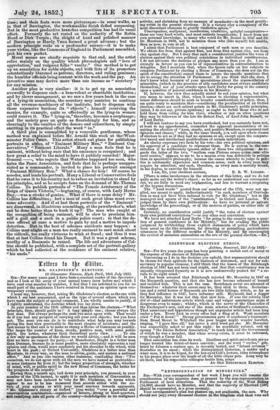EDINRITROH ELECTION ETHICS.
Ashton, Somerset, 22d July 1852 years.4. Sin—For five years the press has been pointing a stalish sort of moral at
the expense of the electors of Edinburgh.
Concurring as I do in the doctrine you uphold, that representatives should be chosen-for their aptitude for the business of statesmen, and not for sub- servieney to popular clamour, I stiWthink that the lesson of the Edinburgh election of 1847 has not been read aright, and that that constituency was as unjustly vituperated formerly as it is now undeservedly praised for "a re- turn to its right mind."
- It has been assumed that Edinburgh rejected Mr. Macaulay in 1847 on the Maynooth question, and that she has now become ashamed of herself and recalled him. This is not the case. Scotchnien never are ashamed of themselves : whatever their errors may be, they stick to them. Sectarian- ism and a rabid horror of Maynooth are two little failings, which, so far as they had influence in 1847, have influence still. - Maynooth had a dagger for Macaulay, but it was not this that slew him. It was the whisky that did it—that unfortunate article which cant and vulgar associations inake it dangerous even to name; whisky, which is the nerve of the Chancellor of the Exchequer's arm, and one of the main arteries of Scotland's commerce. That unsavoury and-opprobrious though not unpopular article had been long under a ban. Every Jack in every office had a fling at it. Weak moralists cried " Put it down!" Strong governments gave it courtesan's treatment from Broad Street to Whitehall the poor beggar might wander barefoot, tinging, " I gave thee all," but never a civil word got she. Mr. Macaulay was respectfully asked to put this right : he scornfully refused, and up sprang "the Excise Reform Association," to teach him and the Government of which he was a member, that when wrong exists, it must be redressed, even though a Cower fall. That association has done its work. Distillers and spirit-merchants are no longer treated like ticket-of-leave convicts ; and the word " excise," gib- beted by Johnson a centuryago is decently buried, and "inland revenue " flourishes in its stead ; while 'the distinguished historian, a sadder and a wiser man, it is to be hoped, for the hot-eyed Celt's lecture, rides triumphant to his proper place over the heads of all the little clique pets. Long may he sit there, and his respectable colleague beside him, prays • • .Aw OLD EDINBURGH ELECTOR.


























 Previous page
Previous page